‘Impossible’ to rescue: How three foreigners died in Burkina Faso
We investigate how a project to protect forests ended tragically with the killing of two Spanish journalists and an Irish campaigner.
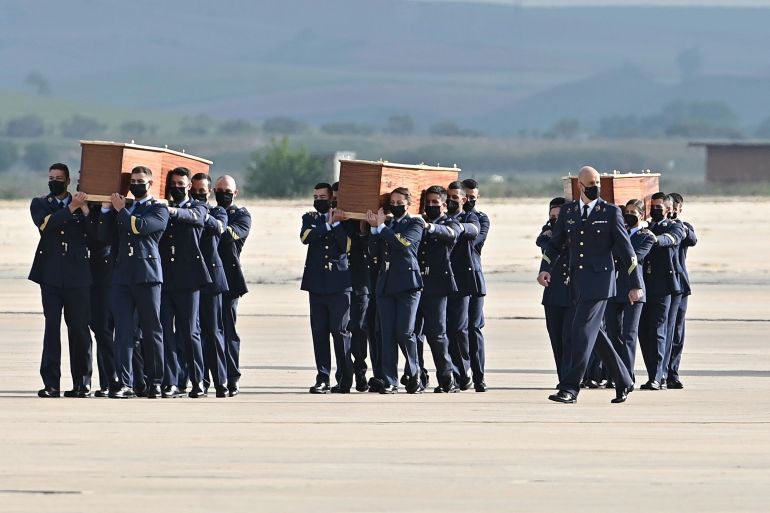
Fada N’Gourma, Burkina Faso – It has been months since Mohamed narrowly escaped an ambush in eastern Burkina Faso that killed three foreigners, yet the soldier cannot shake the guilt of being forced to leave them behind during a mission he says should never have gone ahead.
“There was a terrorist base there,” Mohamed, whose real name we are not using to protect his safety, told Al Jazeera in October. He spoke from a restaurant in Fada N’Gourma in the east, one of the last towns Spanish journalists David Beriain and Roberto Fraile and Irish conservationist Rory Young spent time in before they were killed by armed men on April 26 while embedded in an anti-poaching unit in Arly National Park.
Keep reading
list of 4 items‘Unconscionable’: US sends dozens to Haiti on deportation flight
Ten years after Chibok girls kidnapping: One woman’s struggle to move on
Gunmen kill at least 11 in two attacks in Pakistan’s Balochistan
Visibly distraught, the 31-year-old soldier said members of the army had received intelligence days before the patrol, advising against it; but he believed the report was buried by mid-level officers, a claim Al Jazeera cannot independently verify. Mohamed said that while he did not see the report, he spoke directly to the officers who wrote and submitted it. Separately, analysis from both the Armed Conflict Location & Event Data Project (ACLED) and the International Crisis Group (ICG) reported the presence of armed groups near the park before the mission.
Mohamed feels betrayed by his superiors and riddled with remorse that he was unable to protect the three men. “We wish we had been able to save them,” he said.
Known for hard-hitting reporting in hostile environments, reporter Beriain, 44, and photographer Fraile, 47, were filming a documentary about the challenges of conservation work in Burkina Faso – including efforts by the Burkinabe and aid groups like the Chengeta Wildlife Foundation, led by 48-year-old Young – when their patrol was ambushed in the forest by at least 40 armed fighters.
The three were killed at the scene, according to GPS coordinates from internal military reports seen by Al Jazeera. Six of the 32 Burkinabe soldiers (including several forest guards) were injured but they, along with a Swiss trainer for Chengeta also on the patrol, survived.
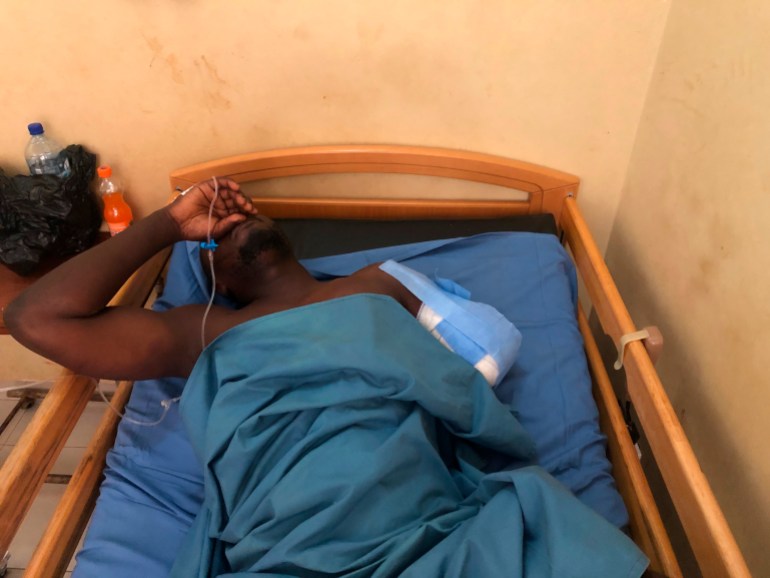
Since the attack, questions have swirled as to what went wrong and why a mission into one of the country’s most dangerous zones was allowed to proceed and with journalists embedded.
Burkina Faso has been racked by violence linked to al-Qaeda and ISIL-affiliated groups which have killed thousands and displaced more than 1.4 million people, the majority since the violence escalated nearly three years ago, with the east being particularly volatile. About 900 people have been killed in the region since 2018, with nearly half the incidents occurring around the area where the April patrol took place, according to ACLED.
“The security situation was very degraded and volatile, that route was under jihadist control,” said Mahamoudou Savadogo, a Burkinabe conflict analyst and former gendarme. People, including government personnel, travel through neighbouring Togo or Benin just to bypass that road, he said.
During a six-month investigation, Al Jazeera spoke to 12 people either directly involved in or with close knowledge of the mission, including military, diplomats, conservationists and aid workers, and reviewed internal security reports and text messages between soldiers. All of them detailed how a lack of chain of command, gaps in intelligence, missteps within the project and pressure for it to succeed, potentially contributed to what transpired.
A plan to protect the parks
Arly National Park, part of the W-Arly-Pendjari Complex (WAP Complex), a UNESCO World Heritage Site, is the largest protected ecosystem in West Africa.
The communities surrounding the park made up of ethnic Gourmantche, Mossi and Fulani people, are farmers and pastoralists. The region has been known for its history of violence, banditry, state neglect and dispossession of the local populations, which has been exploited by the al-Qaeda affiliated Jama’at Nusrat al-Islam wal-Muslimin (JNIM) and the Islamic State in the Greater Sahara (ISGS), to recruit and gain support.
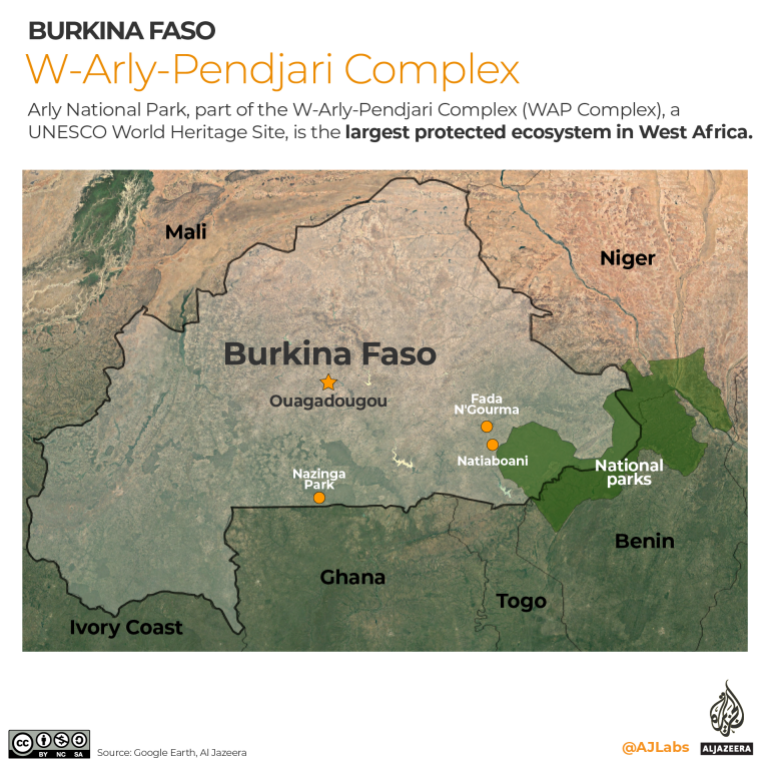
The patrol in the park on April 26 was part of a 1.5 million euro ($1.7m), largely European Union-funded project, which began as a welcome initiative by security forces to protect Burkina Faso’s forests and animals amid the growing violence in the region. It was the first international donor-funded project in the country focused on creating a mixed anti-poaching unit combining the army’s capabilities with the expertise of the park rangers and “eco guards”, privately trained forest security.
Before the insecurity, forest rangers would regularly patrol the parks to stave off poachers but most have since fled as the forests have become increasingly occupied by armed groups, who targeted and chased away the rangers to use the areas as their bases. The lush forest gives them cover to help avoid detection.
Additionally, the armed groups also control significant parts of the major transit routes surrounding the park towards the Beninese and Nigerien borders. By controlling the main roads, they can monitor and control the movements of people and isolate communities, gather intelligence, hamper military movements and disrupt supply lines, while ensuring their own logistics flow and freedom of movement between their own sanctuaries.
Soldiers told Al Jazeera they wanted the rangers to be part of their patrols because of the prior knowledge they had of the forests before the armed groups arrived, and the help they could provide navigating the terrain.
FOMEK, as the project was called, involved two international aid groups, Chengeta Wildlife and the Wild Foundation, and a local organisation, Nature’s Guardian Angels, according to the contract seen by Al Jazeera. The aim of the 18-month project was to sustainably manage the forests and increase the social cohesion of communities living in the protected areas, with each organisation in charge of a different part; Chengeta was responsible for training the rangers, something the group had done in countries like Mali.
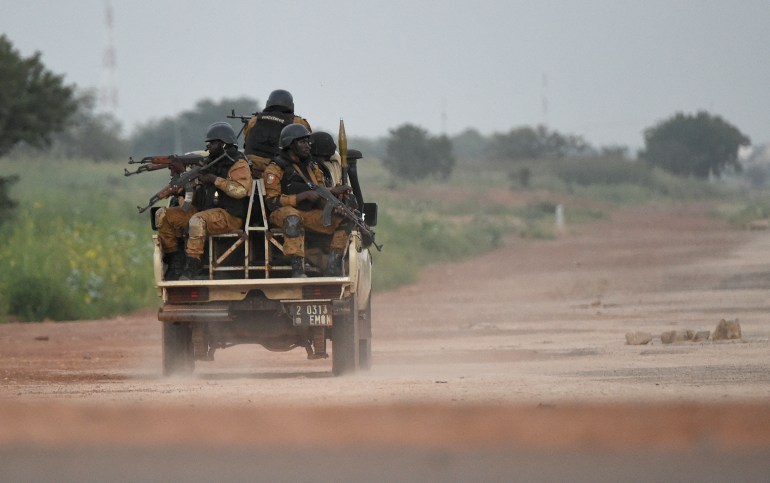
April’s mission was the first since the unit finished its six-month anti-poaching training and the goal that day was to document if there were traces of animals, according to soldiers on the patrol.
Long-awaited documentary
About a week before the April patrol, Beriain and Fraile arrived in Burkina Faso.
They had been discussing the trip for years, according to colleagues, and were making a documentary for Movistar Plus about how authorities in the West African country were tackling poaching, according to the media content production company.
The seasoned journalists from northern Spain had reported from the front lines of many conflicts including Iraq, Syria and Afghanistan. Beriain was a war reporter for more than a decade before founding 93 Metros, a production company that made more than 50 documentaries.
Known for being fearless, he embedded with rebel groups like the FARC in Colombia and interviewed the Taliban in Afghanistan after they killed a group of Spanish spies, say colleagues. “He was one of those people that impacted you. One conversation with him and you would remember him for the rest of your life,” said Sergio Caro, a longtime friend and colleague who covered Iraq and Afghanistan with Beriain.
Fraile covered the war in Syria, where he was injured in 2012 by a grenade, and was known for his dedication to reporting on places less covered. “He was the purest journalist I’d ever met … He knew [the importance of] journalism for society and for [people],” said Roberto Lozano Bruna, a journalist, friend and colleague. In messages he exchanged with Fraile on WhatsApp days before he was killed, Fraile told him they were having a hard time with the mosquitos and the weather, he said.
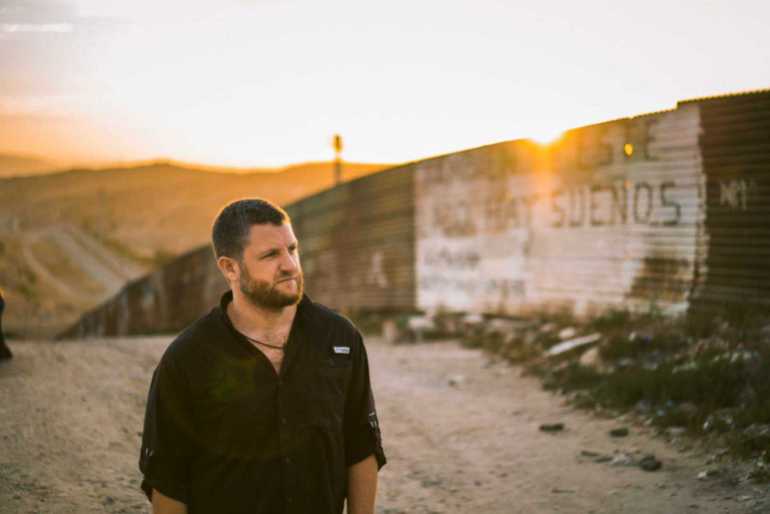
The journalists organised the trip with Young, Chengeta’s director.
Those who knew Young remember him as being calm and self-aware, dedicated to protecting animals and serving local communities. “There is no one else any of us would have preferred by our side in a gunfight,” said Mark Bent, former United States regional security and justice coordinator for Mali and Niger, who was Young’s main contact during his work against wildlife trafficking.
After arriving in the country, Beriain and Fraile spent a few days in the Nazinga Reserve near the border with Ghana, documenting the end of the unit’s training, they then went to the capital, Ouagadougou, and from there travelled east, to Fada N’Gourma.
On Sunday, April 25, they slept at a military detachment in the nearby town of Natiaboani and left for Arly Park the next morning.
Assessing the threat
Known for being one of the epicentres of the conflict in the east, the area around Natiaboani experienced 25 attacks in the last three years, according to ACLED. In the weeks leading up to the April attack, armed men ambushed and killed security forces in the eastern part of Arly Park, according to local media reports. The area is overrun by fighters accused of kidnappings, evicting communities, ambushing military convoys and detonating roadside bombs, while they exploit the natural resources in wildlife sanctuaries and artisanal gold mines.
Fighters from JNIM and the ISGS are known to operate in the region, but JNIM currently has a stronger hold and is believed to be the group that ambushed the anti-poaching patrol. An audio message after the attack, heard by Al Jazeera, alleges it is from JNIM and claimed responsibility for killing “three white people”.
While threat assessments were conducted by Chengeta and Burkinabe security forces before the patrol, conclusions about what to do with the intelligence differed.
According to a call that Chengeta had with the project’s partners after the incident – which was relayed to Al Jazeera by a Western diplomat not authorised to speak to the media given the incident’s sensitivity, but who had knowledge of the contents of the call – aerial surveillance taken before the mission found a group of armed men approximately 35km (22 miles) away from the planned point of entry into the park. On the call, Chengeta said it analysed all of the information and picked a secure entry. It also said it was in touch with the Burkinabe military and that a quick reaction force – a unit capable of rapidly responding to developing situations – was in place with Burkina Faso’s army in Fada N’Gourma, approximately 60km (37 miles) away.
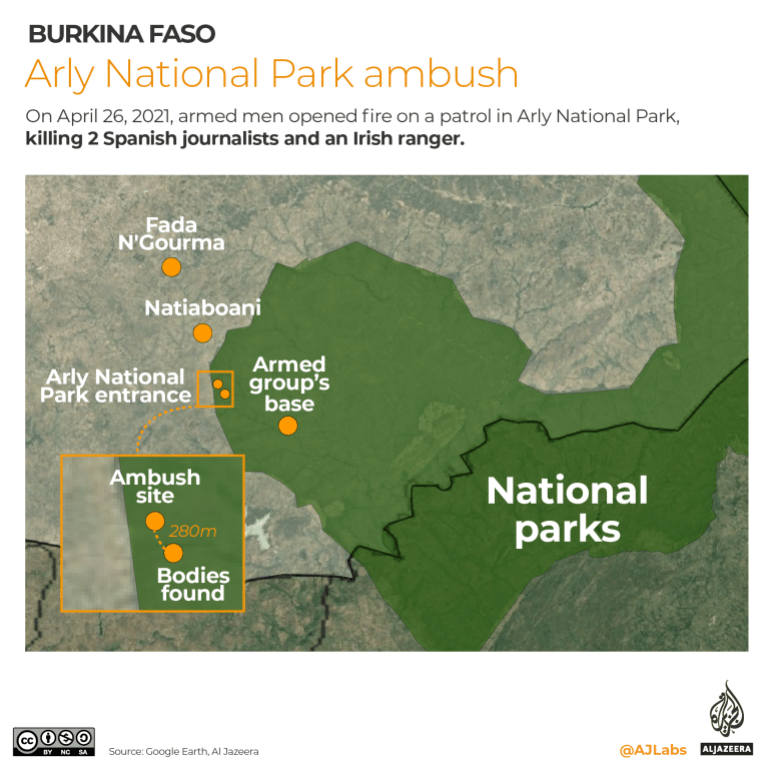
Al Jazeera asked Chengeta why they proceeded with the patrol despite knowing that there were armed groups in the area, but did not receive a response.
That area had three JNIM bases in it, two of which were in the Pama Forest, said Mathieu Pellerin, Sahel analyst for the ICG. “The area was almost entirely under the control of JNIM,” he said.
Another assessment allegedly conducted by two gendarmes days before the mission, also confirmed there were armed fighters in the area and advised against the patrol, according to Mohamed who said he spoke directly to the report’s authors. “The report they wrote … said [the mission] should not proceed. But [the report] was not respected. If it had been respected, we wouldn’t have gone,” he said.
It is unclear if Mohamed’s commander ever showed the report to his superiors or if Chengeta saw it, he said. Al Jazeera cannot independently verify if a report was made and the ministry of defence did not respond to repeated requests for comment.
‘It was impossible for us to rescue them’
On the morning of Monday, April 26, two pick-up trucks mounted with three machine guns accompanied by 12 motorbikes and approximately 36 people, including the four Europeans, entered the Pama Reserve in Arly National Park, 15km (9 miles) from the base in Natiaboani.
The foreigners were split into two teams, Alpha and Delta, according to Mohamed. Young, Fraile and Beriain were in Delta and the Swiss trainer was with Alpha, he said. Once in the park, around 9am, team Alpha spotted elephant tracks, descended from the truck and walked about one kilometre (0.6 miles) inside the forest. Yet almost instantly after walking into the forest, they were fired upon by several gunmen from behind a small riverbed, said Mohamed. The soldiers retreated a few metres while the second truck drove towards them to form a perimeter, he said.
According to the call relayed by the Western diplomat to Al Jazeera, at 9:45am the rapid reaction force in Fada N’Gourma was alerted, at which point no one had been killed and the team was planning to leave. Yet 30 minutes later everything changed.
Approximately 40 armed fighters, who had been waiting for the patrol down the main road, moved into the park, surrounding the unit. A citizen called the military base in Fada N’Gourma to warn of the attack but it was too late, according to an official with close knowledge of the situation, who cannot be identified further because he was not authorised to speak to the media.
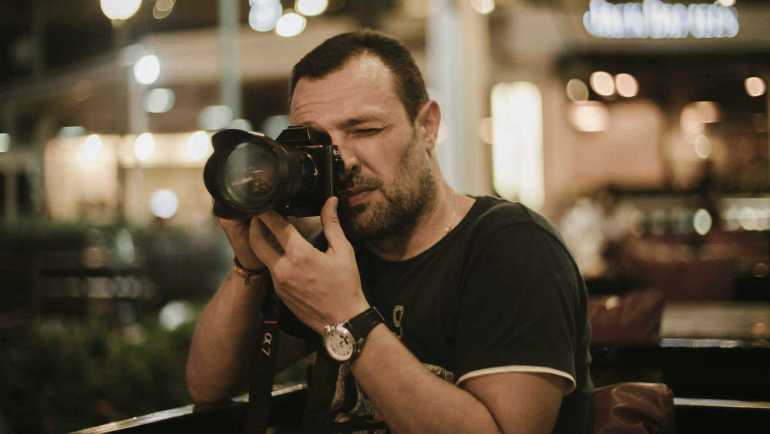
By 10:15am the heavily armed group entered, shooting. One of the journalists was hit almost instantly, according to several soldiers and the summary call with Chengeta. Hanging his head, Mohamed said he still pictures the moment the videographer, believed to be Fraile, was shot while standing outside the truck filming, his camera falling to the ground as the bullet pierced his body. The officers yelled at Young and Beriain, who had gotten out of the truck and were sheltering under it close to where Fraile was hit, to leave, he said. “They were afraid, they didn’t know what to do. It was like they were lost,” he said.
As the attackers intensified their assault on the vehicle where the three of them were hiding, Mohamed was running out of ammunition, he said. Unable to reach them, he retreated.
According to several people, including one eyewitness, the Swiss trainer got on top of the truck, manned the machine gun and started firing, taking over from a soldier who was injured. But soon he also retreated. Together with the rest of the soldiers, they all crawled out of the park the same way they entered.
Young, Beriain and Fraile’s bodies were found a few hundred metres from the ambush site.
“Due to the intensity of the shooting, it was impossible for us to rescue [them],” Mohamed said.
It is unclear if the three were killed in crossfire, but photos of their bodies seen by Al Jazeera show one of them with his hands, possibly tied, behind his back, appearing like he had been executed. A report in El Pais said Beriain and Young stayed with Fraile after he was shot, not wanting to leave him. As everyone retreated, this put the three of them in the line of fire as the attackers encroached on them and the car they were under.
Lack of command and control
The lack of chain of command played a significant role in what went wrong, according to the official who spoke to Al Jazeera. While the army chief of staff knew about the patrol, he never signed the mission order, something that needs to be done before any operation, the official said. Had it been signed, the detachment in the east would have taken control and been able to provide more ground troops during the mission and had the authority to stop it from happening if deemed unsafe or not ready, he said.
Days before the patrol, approximately 15 park rangers who were part of the mixed unit refused to participate, instead staying in Ouagadougou protesting their salary with the support of their union, according to at least five people with knowledge of the situation. The rangers and the soldiers were initially promised jobs and bonuses by the local aid group after the six-month training, but were told after that it was not possible, said Mohamed. Instead of postponing the mission, the army told the soldiers they had to go, he said, so they obeyed the direct order.
“We [thought] that since the rangers weren’t going on the mission the project would stop … But it wasn’t the case, [the military] came and forced us to go,” he said. It “appeared” that the army wanted the project to look successful, yet without the rangers’ knowledge of the park, the soldiers were at a disadvantage, he said.
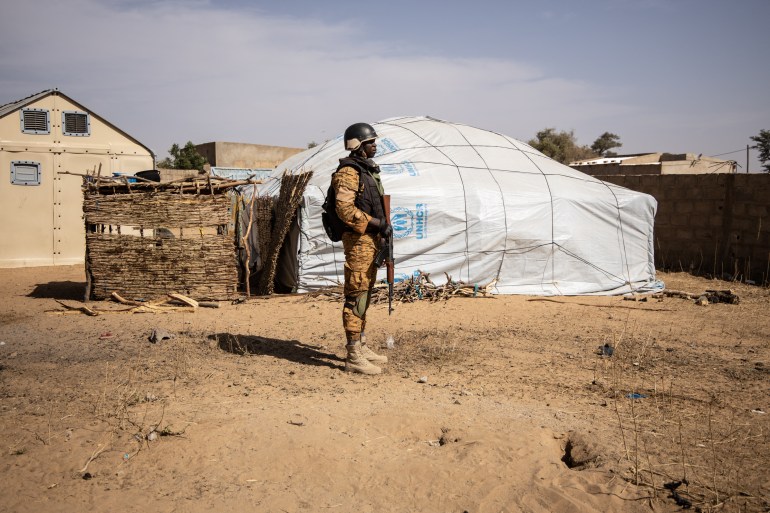
The gaps in information flow and weak command and control point to a “common weakness of security forces in the region, which is an informality that goes hand in hand with a failure of leadership to take responsibility [and] responsibility requires accountability,” said Michael Shurkin, a former political analyst at the CIA and director of global programmes at 14 North Strategies, a business intelligence consultancy based in Dakar, Senegal, who has worked on the Sahel for 15 years. The problem is a culture of letting things slide, which tends to come from the top but which armies at war cannot afford, he said.
A spokesman for Chengeta said the operation continued because there was “sufficient capacity to do so”, without clarifying what that meant, and that it could not comment on Burkinabe administrative issues. Several military and aid workers claim the patrol went ahead without the rangers because Young, Chengeta’s head, had to leave the country later that week and was unable to postpone.
For a mission like this to succeed, however, several other factors needed to be in place, including a lot more preparation, manpower, control of the area and continuous air support during the patrol, said Savadogo. Another key missing component was community buy-in, especially given the already tense relations between the population and the state due to the fact that the community does not benefit from the region’s natural resources, he said. “Many of the population are poachers who live in the area and poachers are not going to accept such a mission. People’s priority today is not the protection of animals, it is their own survival,” he said.
While the EU project was supposed to focus on community engagement, that part was not implemented due to security concerns, according to several people involved. The presence of armed groups in the area made it challenging to access the communities and build trust, according to an aid worker involved in the project who was not authorised to speak to the media. The project was meant to work with 39 communities to manage natural resources, implement environmental protection and provide more than 5,000 people with income-generating activities and medical consults, according to the project’s contract.
The potential consequence was that people, already frustrated by the state, would be complicit with the armed attackers and not feel compelled to alert the security forces of an attack, said Savadogo. “Without this community commitment, not only would the project have the jihadists against it but the population as well,” he said.
‘Everyone knew and no one knew’
Since the deaths of Young, Beriain and Fraile, there has been no official report by Burkina Faso’s government, but blame is being directed at all sides with no one taking responsibility, according to the military, diplomats and aid workers involved.
What stands out about this operation, is that “everyone knew about it but no one knew”, the official with close knowledge of the situation told Al Jazeera. The military, the EU and Chengeta all knew what was going on, but in the aftermath, everyone turned a blind eye, he said.
Some officers said, after the fact, that the three appeared overconfident before the mission given their extensive work in conflict zones and that they pushed back on security advice before the trip as well as during the ambush. An internal report by the army after the attack, seen by Al Jazeera, blamed the journalists for “unfortunately” not following instructions by the military “as far as voices and gestures were concerned” – referring to the soldiers they said had been motioning to them to retreat.
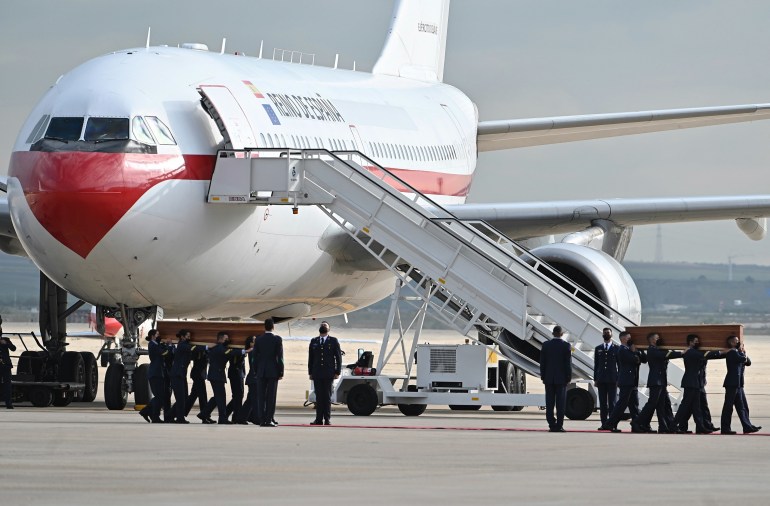
The ministry of defence and the government’s communication ministry did not respond to repeated requests for comment via phone, text and a written letter. However, in a statement in April after the attack, it appeared to point the finger at the three men, saying the government invites “friends of Burkina Faso to comply with the security instructions issued by the defense and security forces during their stay”.
Those who knew Fraile and Beriain said they were professional and would never have disobeyed orders. “They were brave but they were not stupid,” said Bruna, a colleague.
Others say more onus should be put on donors, like the EU, to create less pressure for organisations, specifically local aid groups, which might feel the need to prove that a project is successful in order to get funding. Some people within the project said there was a rush to move things forward, even when certain elements were not in place.
For its part, the EU said the project contract did not require it to be informed during all stages and that it was not notified of the journalists’ visit or that of Chengeta’s Irish representative, according to Wolfram Vetter, the EU ambassador in Burkina Faso. Had the EU been aware, they would have “strongly discouraged” it, given the security situation in the region, he said. The project’s contract expired at the end of August and was not renewed, said Vetter.
Regardless of who is to blame, what happened in Arly Park highlights a worrying trend, say analysts. The continued shrinking space in the country and the region, as armed groups encroach, degrading security, will limit people’s freedom of movement and ability to easily live their lives, said Andrew Lebovich, a policy fellow, at the European Council on Foreign Relations.
And soldiers on the ground, bearing the brunt of the violence, say missions like the one in Arly Park make them feel unsupported by the state and that they are losing patience.
“The Arly mission was badly organised and executed,” said Mohamed. “We are tired of what is going on,” he said.